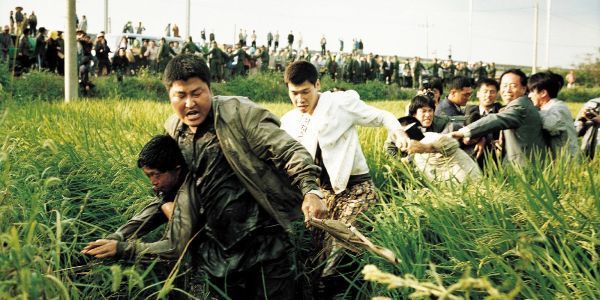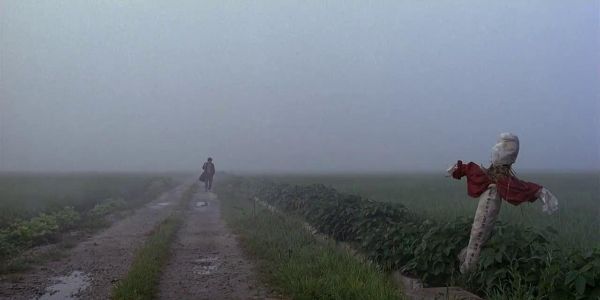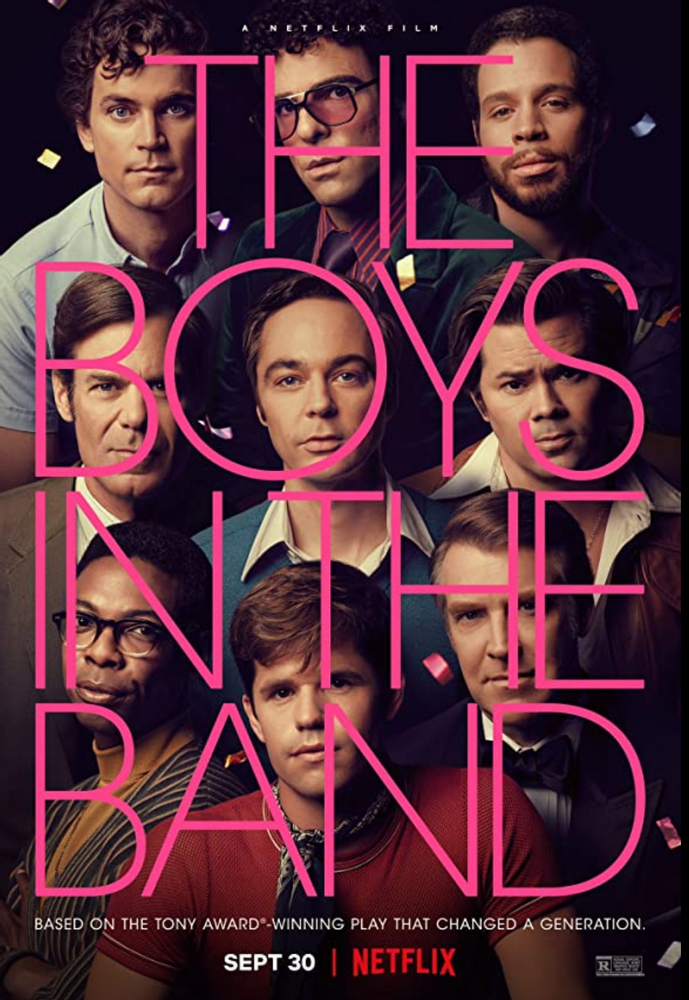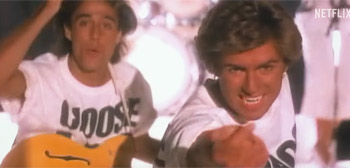MEMORIES OF MURDER: Remembering a Bong Classic
It’s easy to bemoan the fact crime dramas can often feel by-the-book and unoriginal. If there’s not something comforting in them — specifically in the more intimate space of television — then they can be out and out monotonous. Part of the problem comes from a genre being so saturated due to popularity and commercial viability. We’re constantly searching for something fresh and different to pique our interest. Very seldom are we actually rewarded.
That’s one of the great joys of Memories of Murder. Because from purely a storytelling perspective, it synthesizes together something totally compelling. It feels like the kind of crime story you would only see on an off night when all the real stars are off duty and their bumbling sidekicks are left minding the store. At least this is the first impression.
Our hapless lead, Inspector Park (Song Kang-ho), is a good place to begin. The slovenly policeman touts his shaman-like eyes, which allow him to read people, discerning criminals from the general population. It’s just the beginning of his boastful talk as he does his very best to solve crimes in his rural prefecture. He’s also the kind of oblivious lout who asks if Body Heat is an action movie as he taps away at his office typewriter. How can we not love his steady barrage of off-handed comments?

Quickly it becomes evident Bong Joon-ho has laid the groundwork for the serial killer movie that I always wanted to see and didn’t know. While I’m not totally averse to grisly crime movies — I can think of a lot of things I enjoy more — still, Bong gives us so much depth in both his environment and his characters, augmenting everything else.
The first crime scene we get a good hard look at is next to a rice paddy. Forensics is nowhere to be seen when it comes to combing for clues, and any evidence that might be procured is unceremoniously trampled by a passing farmer on his tractor. These messy bits of chaos not only provide a sense of this world, they also suggest how undermanned and outmatched the local authorities are, if not totally incompetent.
They take part in bumbling arrests where the typical crime beats happen in such a way we have no recourse but appreciate them anew. It’s good cop, bad cop; it’s chase scenes along with the aforementioned crime scene investigation tropes. They even reenact a crime for the newspapers, which proves to be a total sham; the man they finger can’t be guilty. But the pressures of the media must be abetted. The chief is in a bind.
The Road To Obsession
If Inspector Park, feels, at times, like a bit of a court jester, Inspector Seo (Kim Sang-kyung) is the handsome counterpart from Seoul who went to a 4-year university and is volunteering on the case. He might as well be our untouchable white knight. This contrast is key. Part of this is the tone Bong readily cultivates, shifting between increasingly somber interludes next to goofball antics. Because the ultimate success of the movie is in its gradual progression toward the depths of obsession.
All the moving pieces add up to something greater: between the scoring, cinematography, and story. However, what ties it all together is this pervasive mood and a sense of the cinematic landscape. It’s littered with oddities and simultaneously injected with unfathomable doses of bleak desolation continually escalated over time.
Soon they have multiple victims on their hands — all beautiful single women, all in red, murdered in the rain — and they cull the countryside for suspects. Their leads go every which way. There’s the melancholy love song requested each night a murder took place. It’s uncanny, but they can’t pinpoint who made the requests. Maybe it has something to do with the mysterious woman weeping in the outhouse behind a nearby school. Later, they race after a phantom in the dead of night, a man who looks incredibly guilty. He’s also a beneficiary of their brutal strong-armed tactics. At this point, a confession feels comparable to the truth. Desperation sets in.

The ensuing muddy palette might be equally fitting for David Fincher, and the cursory parallels to Zodiac no doubt have been mentioned by countless others. I’m by no means an authority on either auteur, but it’s easy to marvel that in only his second movie, Bong has such a distinct world — such a definitive point of view. Soon enough, all the color is washed out of the movie entirely and it goes lifeless and pale in the torrential downpour. It’s like a cruel reminder of their ongoing failures.
What’s equally striking is what happens to our leads. In a bit of irony, our bumbling Detective Park must become a voice of reasons as the others go ape and cave to the pressure of pursuing unconditional closure. By the journey’s end, the comedy has dissipated like a mist, giving way to this heavy, burdensome weight of obsession.
When it looks like their last hope of a conviction is yet another dead end, a spent Inspector Seo says “Nobody will care if I kill you.” It’s a chilling admission but also a matter-of-fact reality. This entire genre is founded on a search for truth and yet what if the truth is tainted? What if the people who are beholden to finding it are indifferent or worst yet openly disregard it?
Memories of Murder: Conclusion
Bong‘s final coda is somehow poetic. If you’re like me, it draws your mind to the cliche that even earns a mention earlier in the film. The criminal always returns to the scene of the crime. But so does the detective. They are forever linked, almost intimately, because they trade wills and study each other’s work. However, as suggested by Bong, it goes deeper than this.
They are both ordinary in their fallibilities, vulgarities, and simple human endeavors. They go to bed, put on their pants one leg at a time, and if you passed them in the street, you probably could never know who they really are. That’s either liberating to realize we are not a race of the righteous and the unrighteous, or it’s supremely terrifying that evil is not how we dreamed it to be in the movies. Depravity is not always black and white. The cinematic paradigm is shifted.
I must bring Zodiac up again if only to address the lack of finality in these films. It occurs to me detective stories are accustomed to following a certain schema. There is a crime — some imbalance in the natural order of things — and then, ultimately, the killer is apprehended, the crime is solved, and order is restored. However, as both Zodiac and Memories of Murder depicted events in real-life, we aren’t allowed that same luxury as they remained unsolved.
It’s not only a subversion of the genre; it’s a maddening reality. We must cope with the living hell of not knowing. It’s hardly a mistake that when Song Kang-ho looks into the eyes of his audience, Bong holds on his face, not unlike Francois Truffaut did with young Jean-Pierre Leaud in The 400 Blows. In both cases, the entire film is borne on their faces.
We cannot get them out of our minds. We cannot forget them. They linger in our memories. How you read them says so much about how you experience the respective films. And of course, they act as an open-ended ellipsis. Either we rail against it or come to a place of acceptance, appreciating the not knowing. I choose the latter. It’s a lot more like life.
What do you think sets apart certain crime stories like Memories of Murder and makes them unique and memorable? Please let us know in the comments below.
Memories of Murder was re-released to theaters in the U.S. in October.
Watch Memories of Murder
Does content like this matter to you?
Become a Member and support film journalism. Unlock access to all of Film Inquiry`s great articles. Join a community of like-minded readers who are passionate about cinema – get access to our private members Network, give back to independent filmmakers, and more.
Join now!




